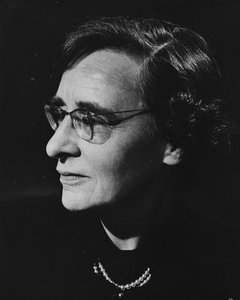Lucy Mair facts for kids
Quick facts for kids
Lucy Mair
|
|
|---|---|
 |
|
| Born | 28 January 1901 |
| Died | 1 April 1986 (aged 85) London
|
| Nationality | British |
| Occupation | Anthropologist |
Lucy Philip Mair (born January 28, 1901 – died April 1, 1986) was an important British anthropologist. An anthropologist studies human societies and cultures. Lucy Mair studied how people organize themselves in groups. She also helped connect anthropology research with how governments work. Her ideas about how colonies were managed were very important.
Contents
Lucy Mair's Career Journey
Lucy Mair started her education by studying Classics at Newnham College, Cambridge. She earned her first degree in 1923. In 1927, she joined the LSE. There, she studied social anthropology with a famous professor named Bronisław Malinowski.
Research in Uganda
In 1931, Lucy Mair began her research in Uganda, a country in Africa. This type of research is called ethnographic fieldwork. It means living among people to study their culture and way of life. She focused on how societies were changing. She returned to the UK in 1932 and earned her PhD.
Teaching and War Work
After getting her PhD, Lucy Mair started teaching at LSE. When World War II began, she worked for the Royal Institute for International Affairs. Later, she moved to the Ministry of Information. After the war, she helped train Australian administrators. These administrators were preparing to work in Papua New Guinea.
Return to LSE and Professorship
In 1946, Mair went back to LSE. She became a reader, which is a senior academic position. She focused on colonial administration and later on applied anthropology. In 1963, she became a full professor. She held this important role until she retired in 1968. In 1964, she was chosen to be president of a section of the British Science Association.
Key Books and Ideas
Lucy Mair wrote many books and papers throughout her life. Her book Primitive Government, published in 1962, is very well-known. In this book, she discussed how political leaders gain support. She also explored how states are formed. This book is still used and referenced by many academics today.
Selected Books by Lucy Mair
- An African people in the twentieth century, 1934
- Welfare in the British colonies, 1944
- Australia in New Guinea, 1948
- Primitive government, 1962
- An introduction to social anthropology, 1965
- Witchcraft, 1969
- African societies, 1974
- Anthropology and Development, 1984
Involvement with the Royal Anthropological Institute
Lucy Mair was very involved with the Royal Anthropological Institute (RAI). This is a major organization for anthropologists. In 1936, she won the RAI Wellcome medal. Later, she served as the Hon Secretary from 1974 to 1978. She was also the Vice-President in 1978–79. After she passed away, the RAI created the Lucy Mair Medal for Applied Anthropology in 1997. This medal honors her important contributions to the field.
 | Valerie Thomas |
 | Frederick McKinley Jones |
 | George Edward Alcorn Jr. |
 | Thomas Mensah |

